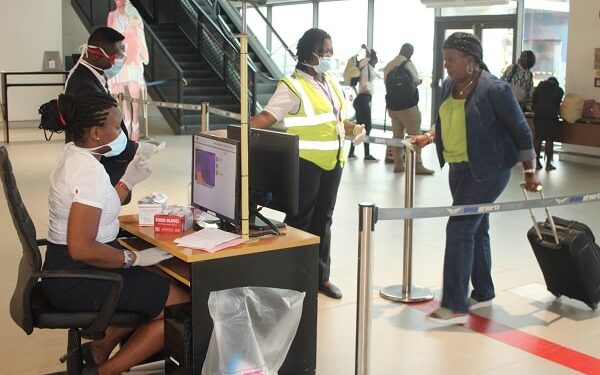All restrictions imposed at the country’s points of entry as part of efforts to limit importation and local spread of COVID-19 have been lifted with effect from Saturday, May 20, 2023.
The decision by the national COVID-19 Task Force is premised on a pronouncement by the World Health Organisation (WHO) on May 5, 2023, that COVID-19 was no longer a public health emergency of international concern.
The WHO said globally, there were decreasing numbers of deaths and hospitalisations with high levels of population immunity against SARS-CoV-2, the virus causing COVID-19.
The Director-General of the Ghana Health Service (GHS), Dr Patrick Kuma-Aboagye, made public the lifting of the restrictions in Accra last Saturday.
Throwing more light on the situation in an interview with the Daily Graphic, he said the decision was also justified by the fact that there had been a sustained decline in COVID-19 cases in the country over the past five months.
He said based on the global and national situation, it was decided at the last national COVID-19 Task Force meeting on May 17, 2023, that: “Pre-departure testing and test at all points of entry are no more a requirement for all passengers”, while from May 20, 2023, “COVID-19 health declaration form for international travellers has been suspended”.
Dr Kuma-Aboagye, however, said some laid-down interventions such as the national vaccination drive would continue to allow for constant vigilance and to protect the population from COVID-19 infections.
Dr Kuma-Aboagye said persons with symptoms of fever, cough and sore throat would be tested for both flu and COVID-19 at the GHS’s sentinel sites across all 16 regions.
“Surveillance will continue to help us identify any new COVID-19 variants of concern.
The public is to maintain general safety measures like hand washing with soap and water or the use of alcohol-based hand sanitiser.
“Persons with complaints of fever, cough and sore throat should report to the nearest health facility for management.
Persons who test positive for COVID-19 are to be managed with existing protocols,” he said.
Providing a highlight on the national burden, he said there had been a sustained decline of COVID-19 cases in the country over the past five months.
“As of May 15, 2023, there were only 18 active cases, none of which is severe or critical.
The only COVID-19 death in 2023 was in January.
“Since January 2023, we have had 187,089 international passengers.
More than 98 per cent of these passengers were either fully vaccinated or persons less than 18 years who were exempted from testing based on our national guidelines.
As a result, only 3,890 passengers were required to be tested, out of which 24 were positive.
“As of May 10, 2023, more than 13.5 million persons had received at least a dose of the Covid-19 vaccine, while 10.5 million persons were fully vaccinated.
Additionally, 4.5 million persons have taken vaccine boosters,” he said.
The WHO said although COVID-19 remained a global health threat, it was time for countries to transition from emergency mode to managing the condition alongside other infectious diseases.
Emergencies
Dr Kuma-Aboagye said the country had had outbreaks of Marburg Virus Disease, Lassa fever, Monkey Pox, measles and yellow fever since the declaration of COVID-19 as a public health emergency of international concern.
However, he said, the health systems in the country had maintained sufficient capacity in the midst of those threats.
“The Ministry of Health and the Ghana Health Service, with the support of our partners, will continue to ensure operational readiness and flexibility to respond during surges of COVID-19, while maintaining other essential health services and preparing for the emergence of new variants with increased severity or capacity,” he said.
Background
On March 12, 2020, the country confirmed the first two cases of COVID-19, the viral disease that had pounded many economies in the world.
The case confirmation came barely 24 hours after the WHO had declared the disease a global pandemic.
SOURCE: GRAPHICONLINE




























